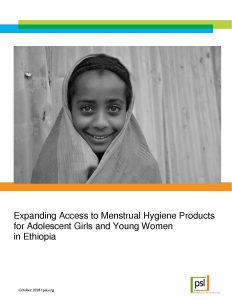Abstract
Menstrual hygiene interventions are complex and involve a number of critical components, including access to knowledge, access to products, access to water, sanitation, and hygiene (WSH) services, and improved social norms. This report focuses on access to products in Ethiopia. It highlights current patterns of product use from Ethiopia’s recent PMA2020 survey, provides a brief summary of the structure of the market for commercial products, summarizes findings from consumer research conducted with adolescent girls and young women (AGYW) age 13-24 in urban Addis Ababa, peri- urban Sendafa, and rural Yetnora and Gohatsion along the consumer MHM journey, and recommends a set of actions to increase access to the products that are preferred by AGYW.
See associated presentation here.



